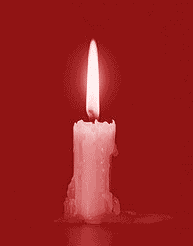
The Candle and Hypocrisy
by
Rabbi Avrohom Czapnik
I am a hypocrite. I teach about the power of words, about how people should not speak ill of others behind their backs and not hurt their feelings when talking to them. I espouse the virtues of using our time well and of having balance in our lives by making time in our busy schedules for the spiritual pursuits of prayer, acts of loving kindness, the study of Torah, and personal character development. I lecture on the virtues of being calm and how in G-d's eyes being angry is as repulsive as idol worship. However, I am far from perfect in all these areas.
One might argue that as a hypocrite I shouldn't discuss these concepts. Ideally I agree, however, I would like to suggest that a little hypocrisy in each of us is a virtue.
In spiritual matters people usually say, "Rabbi, I would love to observe ________ (fill in the good deed of your choice) but it is just not the real me. I need to be true to myself." Yet, in non-spiritual spheres, we are not as honest. At a job interview we don't say "Don't give me the position; the other guy is more qualified". This is not necessarily wrong because often we grow into a job and do it not only adequately but superbly. In spiritual matters, the same might be true. We could grow into a new spiritual position if only we weren't so "honest" with ourselves.
A man who frequented the Chassidic court of the Gerrer Rebbe, of blessed memory, would change his modern dress and habits and put on Chassidic garb when visiting the Great Rabbi. The falseness of his behavior began to gnaw at him until one day he walked into the Gerrer Rebbe dressed in his modern clothing. The Rebbe asked "What's this?" "I didn't want to deceive you anymore," said the man. The Rebbe looked at him and said sadly, "All these years I thought that you were attempting to deceive your friends and when you came to me, that was who you really were!" This powerful story teaches us that we don't have to attain all of our spiritual goals, but we should still strive for them!
The Kli Yakar, a leading 17th century commentator on the Torah, crystallizes this concept for us. He explains the relevance and lessons of balance we can learn today from the construction of the Holy Ark over 3000 years ago. The Ark is discussed (not only in the Raiders movie, but) in the Book of Shemos (Exodus, Chapter 25, verses 10-22). It was a most holy vessel and symbol of spirituality for it housed the Torah Scrolls and Ten Commandments in the temporary Temple in the desert. The Kli Yakar points out that the Holy Ark was different than the other vessels in the Temple. Its measurements were not complete whole numbers. The Ark was 2½ cubits long, 1½ cubits wide and 1½ cubits tall, to teach us that we are never spiritually complete. We cannot rest on past accomplishments, but rather must constantly strive to reach greater spiritual heights. In contrast, the inner box and the outer box of the Ark were made of gold to represent the connection of our inner and outer persona. The gap between who we are and who we aspire to be should never become too great.
The lesson of the Ark is "I may not be there yet, but I am going to try". In truth, we may never know our potential until we do try. When we climb a mountain, we enjoy the new perspective below but we also see new heights that may now be in our grasp.
Before Yom Kippur and on a Yartzeit, the day of remembrance of a deceased loved one, we light a candle. Why? One reason is that it represents the soul -- the human being that lives on after the body dies. The candle is most appropriate to represent the soul as it teaches us an important lesson. Just as the flame of the candle burns upwards, even when turned upside down, so too the soul yearns toward heaven, for a relationship with G-d, regardless of past mistakes.
The candle reminds us to allow our soul to burn brightly upwards, to strive for closeness to G-d, and to emulate Him, no matter what our shortcomings. This can only be accomplished through our effort; if we have goals beyond who we are now and values that are higher than the "realistic" spiritual limits we put upon ourselves.
As my mother of blessed memory would say, "There are no angels in this world". We need not fear our inconsistency but rather our personal shortsightedness. G-d put us in this world not in spite of our imperfections, but because of them, giving us opportunities to struggle and strive toward fulfilling our potential.
The great Chasidic master Reb Zishe said, "In heaven I will not be held accountable for not being as kind as Abraham, or as morally strong as Isaac or as studious in Torah as Jacob, I will be told 'Zishe, why weren't you Zishe?!'".
Let us hold the candle of our souls high and allow it to illuminate who we really can be.
Copyright © 2000 by Rabbi Avrohom Czapnik
Rabbi Avrohom Czapnik is Director of the Jewish Learning Exchange, and is Assistant Principal at Yeshiva Rav Isaacsohn in Los Angeles.
Torah Organization/Features/Spiritual Focus
Back to Apprentive Weavers
|
